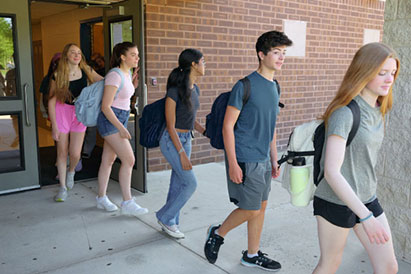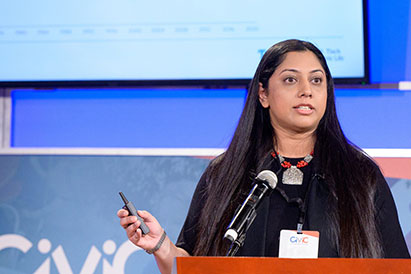On the State of the Nation
If I’m being honest I’m pretty hopeful because I know, over time, things get better. As a historian, I don’t think our current struggles are any more unique than those faced during other times in our history.
Since I pay attention to politics, I know that bipartisan bills pass and that the Supreme Court is unanimous in its decisions a majority of the time. That’s not what gets covered in the media, though, because that doesn’t make for exciting news. I don’t think we are so diametrically opposed as some of the media wants to make us sound like we are, and this is reinforced when I talk to my students and their families. We are a nation that deeply loves its communities and its children.
In order to teach civics, you need to know who your kids are, their families, their needs. You have to deeply, deeply invest in where you are.
On the Value of Civic Education
We were studying the American Revolution in my A.P. U.S. History class. There are obviously no videos from the 1770s, so I’m showing them a couple of clips from this John Adams HBO series. There’s this beautiful scene where John Adams says, “In my life I want a country. I want a country.”
I want my kids to have a country—to have a place where the virtues of who we are as a people are secured for all. They are the ones that are going to have to do it.
So, it’s about learning the skills and having the knowledge needed to engage in a democratic society—to ensure that the values of our Republic are maintained over time. We have to ensure that the next generation has the skill set to be good caretakers of the system that so many have worked to preserve. That’s the value of a civic education.
What Civic Education Looks Like in the Classroom and at School
Right off the bat, we create classroom norms on how we engage with each other. These are built by the students, not by me. There’s more buy-in this way. We review our norms before we launch into any conversation that might become ideological. As a result, I see a lot of honoring of each other and not a lot of heated debates.
My kids want civil dialogue. I hear it routinely. They’ll say, “Why can’t people just have a conversation?” In many ways, due to social media, there’s a greater level of awareness than there was even six years ago. As a result, students share and post on issues that feel dear to their heart, but they’re also being attacked for thinking about these issues and they often don’t know how to engage with that. So I feel impassioned by this work. If I can get my kids to engage with different opinions on really serious issues, then we can move the ball forward in progressing democracy.
Largely, I lead my class from a place of inquiry. Instead of being the ‘sage on the stage,’ I want to guide my students in understanding how various groups might think about issues. I want to help them find the necessary sources to help them understand.
Beyond the classroom, we set up school governing systems in which our students feel that their voice is imperative. If the democratic process feels removed from you, then you don’t have a say and don’t feel like decisions impact you or matter to you. As the student council director, I try to create systems where student voice is part of the decision-making. Through this, students see the value in the democratic process—engaging, reading, and understanding.
On Teaching Civics
A lot of folks probably don’t know how much effort a civics teacher has to put in outside of class. Part of my homework is paying constant attention to the news—from understanding the background of current events to making sure I know the rules of the House of Representatives in order to answer student questions. That’s a lot of work outside of school hours that has nothing to do with grading papers or writing a curriculum. It has everything to do with how I “fill my bucket with content knowledge in order to support my kids’ education.”
The amount of paying attention I have to do toward media sources is just fascinating. And then, I’m having to practice the same inquiry and media literacy skills that we’re teaching our kids, right? And I have to prepare for handling crises that happen in the middle of the day for which I don’t yet know anything about. You must be able to maneuver through tough times, and know when it’s appropriate to push and let students take the reins.
It used to be that the teacher was the expert in the room, but with kids having access to so much information with the world wide web, we have to re-evaluate what it means to learn history. A positive shift in this regard has been to teaching concrete, tangible skills that have greater longevity than content knowledge alone. For instance:
- How do we read graphics?
- How do we corroborate sources to ensure that the media we’re looking at is accurate?
- How do we engage people in civil dialogue?
I also don’t think most people see the nuance of just how thoughtful I must be with my word choices. I will frequently pause with students, and think about how to express an idea without betraying my own perspective. I’m really transparent with kids about this. It’s mental gymnastics in a way that I’m not sure other professions have to do. I even ask my principal to come into my classroom to observe, as I trust her judgment as to whether I’ve taught with bias or not. I take this step preemptively to serve as a check as faith and trust are essential, and built over time.
On iCivics
I have nothing but love for iCivics. The resources are easy to navigate. As a teacher, I need materials quickly, and iCivics’ materials are “plug and play.” iCivics is great precisely because it has educators involved in the process of developing its curricular resources.
iCivics also responds to my needs. Four years ago, I had multilingual learners that were newcomers. I was trying to build capacity for the target language but also build civics capacity, and I needed resources that could help me. So, I reached out to iCivics and told them I was struggling. And iCivics actually responded back! They told me what resources already existed in Spanish and what was to come. Having a curriculum organization answer you is amazing!
Most importantly, students enjoy—and find value—in the iCivics curriculum. The materials are phenomenal, and the team that puts the materials together are clearly hard-working. We see that as classroom teachers because the materials help the kids explore and open their eyes.
About Shari
Teaching experience: 20+ years—high school social studies, including AP U.S. History, AP Government, economics, etc.
Select Awards:
- 2016 Washington State History Teacher of the Year
- 2015 Regional Teacher of the Years
- 2013 Nancy Lyman Roelker Mentorship Award—awarded by the American History Association to honor teachers who have inspired students in a way that’s changed their lives
- 2009 James Madison Fellow



